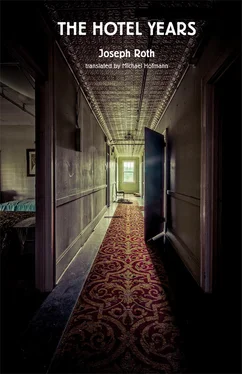Joseph Roth - The Hotel Years
Здесь есть возможность читать онлайн «Joseph Roth - The Hotel Years» весь текст электронной книги совершенно бесплатно (целиком полную версию без сокращений). В некоторых случаях можно слушать аудио, скачать через торрент в формате fb2 и присутствует краткое содержание. Год выпуска: 2015, Издательство: New Directions, Жанр: Прочая документальная литература, Прочая документальная литература, Культурология, Классическая проза, на английском языке. Описание произведения, (предисловие) а так же отзывы посетителей доступны на портале библиотеки ЛибКат.
- Название:The Hotel Years
- Автор:
- Издательство:New Directions
- Жанр:
- Год:2015
- ISBN:нет данных
- Рейтинг книги:3 / 5. Голосов: 1
-
Избранное:Добавить в избранное
- Отзывы:
-
Ваша оценка:
- 60
- 1
- 2
- 3
- 4
- 5
The Hotel Years: краткое содержание, описание и аннотация
Предлагаем к чтению аннотацию, описание, краткое содержание или предисловие (зависит от того, что написал сам автор книги «The Hotel Years»). Если вы не нашли необходимую информацию о книге — напишите в комментариях, мы постараемся отыскать её.
Frankfurter Zeitung
The Hotel Years — читать онлайн бесплатно полную книгу (весь текст) целиком
Ниже представлен текст книги, разбитый по страницам. Система сохранения места последней прочитанной страницы, позволяет с удобством читать онлайн бесплатно книгу «The Hotel Years», без необходимости каждый раз заново искать на чём Вы остановились. Поставьте закладку, и сможете в любой момент перейти на страницу, на которой закончили чтение.
Интервал:
Закладка:
And now from this excess more calculated to win my respect than my heart, let me come to a subject I am able to approach with affection: the people of Magdeburg struck me as more estimable than their new buildings. I knew no one when I got here, I knew several when I left. That speaks for the town. It’s not possible to remain a stranger here for long. They were quiet, critical, warm-hearted people. A few with that blessed trait of having returned home after wanting to see the world and feeling homesick that is sometimes called “humdrum” or “prosaic”. No doubt it has its narrow-minded citizens, every town does. But it also accommodates a few un-bourgeois free spirits. They patronize a modern bookshop, and put on literary evenings. Yes, it even seems to me that this practical-minded, industrious, and architecturally inclined town is blessed with that sort of atmosphere in which native and stranger alike may lapse into forgetfulness and settle. The past nestles in the old buildings and blows from the Elbe port through the old part of town. The people are small-townish enough to have whims and eccentricities. The best of them have no desire to be metropolitan. They have time. The trams are reassuringly slow. The women are attractive. And the curfew hour is late.
From time to time I think of describing the “German”, or defining his “typical” existence. Probably that isn’t possible. Even when I sense the presence of such a thing, I am unable to define it. What can I do, apart from writing about individuals I meet by chance, setting down what greets my eyes and ears, and selecting from them as I see fit? The describing of singularities within this profusion may be the least deceptive; the chance thing, plucked from a tangle of others, may most easily make for order. I have seen this and that; I have tried to write about what stuck in my senses and my memory.
Kölnische Zeitung, 3 May 1931
* Echo and corridor: German allows a rather superior play on words here— Hall und Widerhall .
II. Sketches
12. The Fraternity Member
The fraternity student is the only zoological creature whose natural distribution has nothing to do with natural factors — with geography and climate — but is dependent on nations and governments. While in countries whose biological conditions are similar to those in Germany he may already have become extinct, or never even have arisen, we get him here, and in innumerable variants. (The technical name for these is couleurs .)
One encounters him in bars, on duelling-grounds and at nationalist meetings (such as lectures by Professors Roethe, Freytag-Loringhoven and others), also in lecture rooms. The fraternity student can be identified at a glance: the hypothesis that God created man in his own image receives a practical rebuttal by the facial markings which are called “scars”. Askew on his closely cropped skull he sports a cap that would be the envy of any American messenger boy. Across his chest he wears a gaudy sash of two or three colours in which may be picked out a ringing phrase, as for example: “With God for King and country!” So he projects his innermost feelings and convictions, a slogan on two legs, nourished on beer and tradition, and kept in his paper life by the extraordinary long-suffering patience of German citizens. Since he has no contents, he lives on as a shell; a little like a paper lantern the day after a party.
In order to demonstrate the purpose of his existence all the same, he creates tumults and affrays — in the mistaken view that acoustic effects entitle one to exist. Even though this is where he betrays his outstanding past and present anachronism. His noise resembles the underworld stirrings of incompletely deceased ghosts.
Because he has slipped the bonds of time, he believes time is out of whack. Because he sleeps away the day, he only ever sees the world by night — and then often double. Therefore he fails to apprehend the dimensions of reality. Seeing ghosts, he is his very own ghost, seeming in the chime of a beer glass to hear the bells of Old Heidelberg. Drunkenness that saps others gives him strength. He lives from the mould of the past and decay. His sheen is as that of a dead body that phosphoresces at night. Even so — and because he is a corpse that history has failed to bury — he makes his way, called a career, protected from unsympathetic reality by laws and customs — to the top of the legal, political and medical professions. He pronounces sentences and prescribes castor oil. He becomes a professor and imagines he is spreading knowledge when he shares what he thinks he knows. Ideals from the nursery deck out his walls and hang in his brain. One day a young beer drinker becomes an old fart. Just as if he had never been alive, he wanders through the years, on the periphery of the world and yet thought to be a part of it, becomes grey and finally dies the death of the living, at the end of a life of the dead.
To his grieving fraternity, he bequeaths beer stein, sabre, swastika, cap, sash and whatever else he may possess in the way of student knick-knacks. Making haste to follow him, the next generation comes along, and plants their hopes, which to us are disappointments, on his grave…
Vorwärts, 24 February 1924
13. Guillaume the Blond Negro
The blond Negro, the self-contradiction, the living denial of his “black shame”, the manifest Negro with the blue eyes, a figure for Dinter, I addressed on the train from Wiesbaden to Koblenz.* A lot of stout citizens were on the train, and in a corner by the window sat the Negro. Did I say Negro? The man had thick lips, splendid white teeth, strong cheekbones — but also fair curly hair and eyes of forget-me-not blue. The whole carriage was staring at him. He was wearing a French army uniform and reading a book, a German book. Finally a fat gentleman, a traveller, a Tom, Dick or Harry, a helpful man who would offer unsolicited advice to anyone, and who knew the train timetable by heart, could help himself no longer. He leaned across to the blond Negro, and asked: “I say, what’s that book you’re reading?” The Negro replied: “It’s a Sven Elvestad, just a run-of-the-mill thriller.” Thus showing his superiority to the questioner, who had never heard of Sven Elvestad, and to whom a thriller was hardly run-of-the-mill.
Now the ice had been broken, and the Negro started to speak. He spoke German. A fluent German, with a deep, pleasant, sonorous voice. He had already been in Europe for four months. He knew some of the major German cities, such as Cologne, Frankfurt, Hanover, Koblenz and Düsseldorf. He felt very much at home in Germany. People were perplexed that he was blond. When he went out for a moment, the heavy gentleman said to his neighbour: “I say, will you ask him how he got to be blond?” But when the Negro came back, no one asked him.
We both got out at Koblenz. He left the carriage with a hearty South German greeting: “Grüss Gott”. A Grüss-Gott Negro. What a wonderful mixture — almost pure Aryan.
At the station in Koblenz he excited great interest. He was tall, broad-shouldered, high-hipped, a wonderful specimen. We waited together outside the left luggage office. He was leaving a heavy suitcase. I let him go first. He declined. We spent five minutes arguing about which of us should give in his case first. Things slowly escalated into a black shame. Finally we began talking personally, and this is what the blond Negro told me:
His name is Guillaume. But not just Guillaume, also Thiele. So his real name is Wilhelm Thiele, and he’s a sergeant, and a member of the occupying army, and hence an enemy of Germany. A Negro and blond and blue-eyed, a bundle of contradictions. A political, an ethnological paradox.
Читать дальшеИнтервал:
Закладка:
Похожие книги на «The Hotel Years»
Представляем Вашему вниманию похожие книги на «The Hotel Years» списком для выбора. Мы отобрали схожую по названию и смыслу литературу в надежде предоставить читателям больше вариантов отыскать новые, интересные, ещё непрочитанные произведения.
Обсуждение, отзывы о книге «The Hotel Years» и просто собственные мнения читателей. Оставьте ваши комментарии, напишите, что Вы думаете о произведении, его смысле или главных героях. Укажите что конкретно понравилось, а что нет, и почему Вы так считаете.












